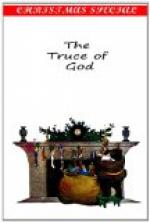Gilbert was not permitted to accompany the Pontiff to his retreat, but was dispatched to Matilda with an account of all that had occurred. He found the magnanimous princess threatened by an army more than treble her own. But she was undismayed and full of hope, meditating a bold enterprise that was crowned with success. In the dead of the night, when the imperialists, secure in their numerical superiority, were plunged in sleep, she led the remnants of her troops into the hostile camp. The sleepers awoke to the cry of “St. Peter! St. Peter!” and perished ere they could grasp their arms. The chivalry and nobility of Lombardy were well-nigh exterminated. In a few hours, corpses and tents alone remained of the hostile array. Why should not Sorbara be as magical a word as Thermopylae? It would be, if the Christian chroniclers had shared the pride or shown the polish of Grecian historians, and if modern Christians felt a Grecian enthusiasm for the deeds of their Christian ancestors. Matilda differed from Leonidas but in one respect—in surviving the action and remaining victor on the field.
Some days after the battle, Gilbert was summoned into Matilda’s presence.
“I owe you more,” she said, “than I can ever repay. Your former voluntary services and fidelity are enhanced by your brilliant exploits in this last victory. Be pleased to style yourself Governor of Modena.”
Gilbert advanced a step, and sinking upon one knee, replied:
“Madam, I came to share in your generous devotion to our common Father, and to assist you as best I could. You are now—thanks to your own valor—victorious and secure. I must decline your bounty, for from this moment I renounce the soldier. Here is my sword, madam; since Rome and you no longer require it, I shall not need it; nowhere would I more willingly resign it than thus at your feet.”




